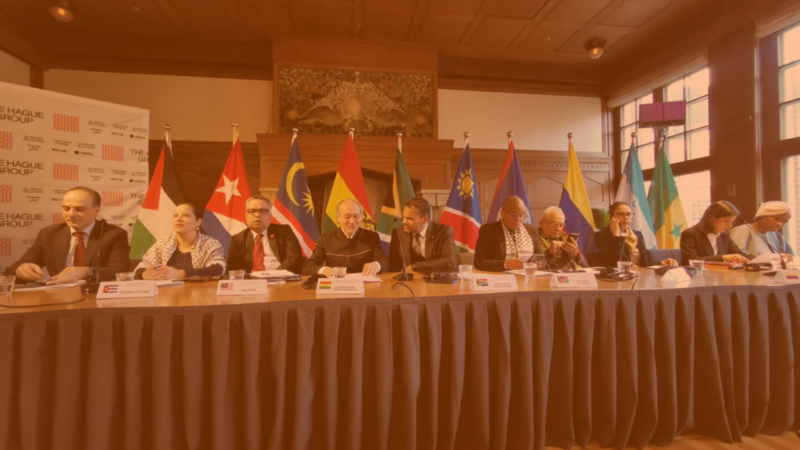It’s 2015, and I’m in a dusty, run-down cafe in Heraklion, Crete. The left-wing party Syriza has called a referendum on whether to accept the lenders’ bailout terms. And EU officials have launched an intense pressure campaign.
Commission President Jean-Claude Juncker is on the cafe’s wood-panelled TV, warning Greeks to vote “yes”. As he finishes his speech, an old woman rises from her chair and shouts at the screen.
“You know what?” she booms. “I was thinking about voting ‘yes’. But now I’ll vote ‘no’, just to spite you.” (I’ll spare you the expletives that followed.) Soon after, ‘No’ wins the Greek referendum. In a major — albeit fleeting1 — democratic victory.
Ten years later, I’m in the kitchen of my Athens apartment, having a row with my adolescent son. On the edge of losing the argument, I draw a boundary — we’re not discussing that part.
And immediately, he digs in further.
Le Pen’s ban: Lawfare in real time
These aren’t the reactions of crazy old ladies or hormone-addled teenagers. They’re the product of human nature.
These snapshots help answer a simple question: when the establishment uses the courts to sideline opponents, with the full weight of the state — why does it keep backfiring?
Case in point: the conviction of French hard-right leader Marine Le Pen, which we broke down on last week’s DiEMTV livestream with Glenn Greenwald, David Broder and Yanis Varoufakis.
Le Pen misused EU funds — something one in five MEPs have done without consequence. I’m no fan of her ethnonationalist politics. But the punishment is wildly disproportionate to the offence.
She’s the front-runner for the French presidency, and now she’s been banned from seeking office. The courts are denying millions of voters the right to choose their next president, a tactic known as ‘lawfare’.
And yet. While Le Pen may be unable to run in the next election, her ideas — and supporters — aren’t going anywhere. In fact, they’re still leading in the polls. All her party has to do is work out how to capitalise on what the system has given them: a moral high ground they didn’t earn. (They’ve already started, big time.)
A decade of pressure politics
As Glenn noted in our conversation, the system has spent a decade perfecting this antidemocratic game. It’s now routine to react to popular dissent not by engaging with it, but by declaring it out of bounds.
And like the Greek referendum, it usually2 backfires. Here’s a quick list:
In 2016, the UK political establishment tried to terrify people into voting to remain in the EU. “Project Fear” didn’t work. Brexit passed.
In 2018 a Brazilian judge jailed Luiz Inácio Lula da Silva and barred him from standing. Polls measured a five-point rise in his support within a month.
Spain’s Supreme Court sentenced nine Catalan leaders in 2019. 600,000 people marched in Barcelona and the independence vote refused to fade.
Romania’s Constitutional Court annulled the first round of last year’s presidential election after an outsider took the lead. Pollsters recorded a jump in intended turnout for the re‑run, a surge built almost entirely on resentment.
And Germany’s government is drafting a hate speech law that could ban the AfD; the party has climbed from 15 to 24% in national polls.
Each case meets the definition of lawfare: convenient timing, dubious motivations. And a punishment that strips voters of a choice.
The system never learns
The reason lawfare keeps producing the opposite result is obvious.
Look at it emotionally: people have a sense for foul play, and resent it. They’ll always push back against limits they consider unfair. As with my son and the woman in the Heraklion cafe.
Or mathematically: the number of voters that support due process far outnumbers the supporters of any single ‘extreme’ party. Or from a messaging standpoint: by shutting down your opponent, you invite the public to sympathise with them. Not necessarily with their ideas, but with their right to participate.
So if we understand this, why doesn’t the establishment? I put the question to David Broder on our livestream. His (edited) response:
They have an exaggerated belief that this kind of accusation or conviction is damning. That people are great believers in the established institituions, in republican propriety. [..] A lot of people who are close to political power do think like that.
It’s classic projection, at the system level.
Why movements should pay attention
In Europe, these authoritarian tactics mostly target parties seen as ‘hard right’. Because that’s where the serious anti-establishment threat lies. (Grassroots organisers face lawfare too, but on the streets, not at the ballot box. See my interviews with Melanie Schweizer and Miguel Duarte. But of course, these cases rarely trigger the same public backlash, or shifts in electoral power.)
But it’s still worth thinking about how we can react when lawfare happens to our opponents. In the past, it was common to side against the hard right at any cost, and support all attempts to put them out of bounds.
The reaction to the Le Pen case suggests that’s changing. Many politicians and commentators, from across the ideological spectrum, emphasised the need to challenge her party through democratic rather than judicial means.
They’re onto something. If we stand up for democratic norms — even for our opponents — we can keep the debate honest.
Yes, hate speech and fraud still demand legal action. But after the vote has happened. Under rules announced well in advance. And with penalties that don’t strike names off the ballot.
So call out lawfare and reject procedural repression wherever you see it. And vitally, get to work on offering a real alternative to a system that seems to fear the electorate. Fight bad ideas with good ideas.
It’s not about endorsing Le Pen or AfD. It’s about refusing to surrender democracy to the authoritarian establishment and nationalist reactionaries alike.
That’s the opening. Will we take it?
This article was first published on the Subvrt activism newsletter
Notes
1: Of course, the result was later effectively overturned. But that vote was a democratic victory in its own right. And maybe the last big burst of leftwing power in Europe.
2: Once in a while, proportionate sanctions work. Italy barred Silvio Berlusconi in 2013 for proven tax fraud and his vote share slid for a decade. This is the exception though.
Do you want to be informed of DiEM25's actions? Sign up here















